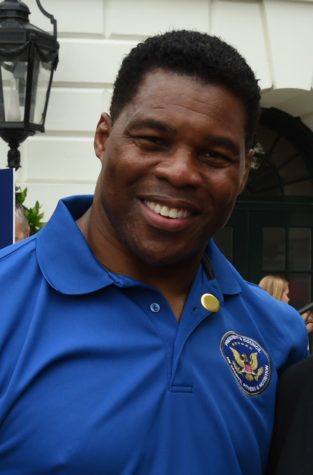Putting the ‘Con’ in Congress: The State of American Politics
The landscape of Conservative politics in America has left much to be desired, for all parties involved.
Here is the U.S. Capitol Building. the seat of the United States Congress,
Imagine taking your first steps towards Capitol Hill, entering the House of Representatives in the hands of a prominent leader, and being put up for a vote. That’s right. You are a bill, only a bill, and you are sitting here on Capitol Hill.
Unfortunately, the divided Congress cannot agree on your relevance, and a big red stamp, “DENIED,” is placed on you.
Congratulations are in order.
You have officially been rejected by the United States’ 118th Congress.
This re-enactment of the legislative process rings true, highlighting the partisan nature of politics in the modern era. Conservative political leaders, including Senators Chuck Grassley (R–IA), Ted Cruz (R–TX) and a majority of their colleagues, have decided to oppose virtually every proposal put forth by their Democratic colleagues.
Whether it pertains to raising taxes on the wealthy, climate activism and reform, or codifying abortion law, the state of the Republican Party has been strong.
However, the 2022 Midterm elections divided the party into factions, those ready for Former President Trump’s official reemergence and those insistent on a change in leadership. Considering this split, as well as the disappointing outcome of said elections, conservative politicians have had a great deal to reflect upon. Despite aspirational expectations and projections, Republicans failed to assume control of the Senate and only claimed the House by a slim margin. According to FiveThirtyEight, a political news organization dedicated to predicting election results, the Republican Party, in 59 overall projections, was expected to control the House in 84 of 100 estimated outcomes and regain control of the Senate. The reality, however, proved a major disappointment for Republicans.
Republicans have disagreed on the culprit, but many have blamed Former President Trump and his election denialism, which distracted voters from far more relevant textbook conservative policy matters like inflation. In fact, the faction of moderates, tired of the radical bent of the party, continues to multiply, as calls for a reversion back to the Reagan days are growing louder.
The cadre of more radical politicians, consisting largely of the Freedom Caucus, have wreaked havoc in the House, fighting with their colleagues about the speakership. Kevin McCarthy (R–CA), the Speaker of the House, required fifteen rounds of voting to emerge in that role, the longest time dedicated to electing that position since the early 20th century. Politicians like Matt Gaetz (R–FL) and Lauren Boebert (R–CO) provided staunch opposition, foreshadowing a potentially unproductive two years in the House.
Perhaps this newfound consciousness among some Republican politicians will cause a mass reflection by Republican voters. And if they are going through the trouble, I would love for them to evaluate what happened to the traditional conservative values, and why largely religious, economically-minded voters support candidates whose character diametrically opposes their policies.

(United States Department of Health and Human Services, Public domain, via Wikimedia Commons)
The figure most emblematic of this hypocrisy is Herschel Walker, Republican Senate candidate and runner-up in Georgia. His qualifications include a Heisman Trophy and being a two-time NFL Pro Bowler. In fact, Walker exemplifies, much like Trump, an emerging type of less-politically experienced candidate, thrust in the spotlight by some call-to-fame. This trend, a shift from political veterans like John McCain and Mitt Romney to less qualified individuals, was visible across the Midterm elections.
Newly-elected Ohio Senator J.D. Vance, for example, wrote Hillbilly Elegy, a renowned New York Times best-selling memoir. Pennsylvania Senate candidate Mehmet Oz built a following through, Dr. Oz, his daytime-Emmy winning advice show. Oz suffered only a three-point defeat to his opponent. These two competitive politicians demonstrate the aforementioned adjustment made within the new political arena. Essentially, the establishment is faltering at the hands of more celebrated public personalities. Even musician Kanye West has announced his interest in running for President in 2024.
While Walker experienced his fair share of criticism from the media, pointing out damaging contradictions in his policy and character, Conservative Unions, Super PACs, and voters continued to back him. Thirty years ago, his actions would have tanked his campaign, but now, the religious right turns a blind eye to Walker’s moral transgressions (even ignoring his illogical speeches and comical policy positions). Walker’s campaign, despite being outfunded by his opponent, Incumbent Raphael Warnock, had sustained itself through grassroot donations and a few PACs. Most notably, the Senate Leadership Fund had allocated millions alongside 34N22, another organization that supported his campaign.
Walker, even after his narrow defeat in a runoff election, serves as a representation of many conservative politicians, who have seemingly distanced themselves from their original principles. The Republican Party exists on a platform of small government with state autonomy, fewer taxes, and a strong defense system, not to mention the religious (Christian) roots embedded in the party. Conservative political leaders constantly recite Biblical scripture and appeal to their constituency’s connection with Jesus. In fact, according to a Gallup poll, “50 [percent] of Republicans are highly religious, above the national average.”
Despite their beliefs and outrage behind closed doors, Conservatives still supported Herschel Walker in large numbers. Senator Lindsey Graham (R–SC), for example, expressed outrage at attacks on Walker’s character, claiming that Democrats “[were] trying to destroy Herschel to deter young people of color from wanting to be conservatives.”
Politicians have always jumped at the opportunity to attack their opponents’ character. Back in the United States’ infancy, when Hamilton and Jefferson engaged in discourse, both men utilized the very same tactics. Jefferson and the Democratic-Republicans attempted to convince the public that the proponents of centralized power were pro-British traitors. Respect for political opposition was always a thin veil to shield disdain. However, until the Clinton administration, in which House leader Newt Gingrich openly detested President Clinton, there seemed to be a baseline level of respect and acceptance of bipartisan politics. These convoluted and twisted political tactics are hardly revolutionary (pun very much intended).
Yet, the tensions are at an all-time high, particularly after the January 6t, 2021 Insurrection.
Despite the pervasiveness of this political conflict, Graham and his colleagues’ actions are not merely political chess or pandering. The silence is telling, as ignoring wrongdoing within their party exemplifies the behavior of certain members of the conservative base, casting their moral judgments aside to endorse problematic candidates. Clearly, for better or worse, the striking truth among Republicans is that winning is far more important than upholding their traditional ideals.
That said, Democrats struggle with similar problems. To many, however, their standards for behavior are too important, and often prevent them from maintaining power. In simple terms, taking the moral high ground, as the Democrats have prioritized, though admirable, has not been the recipe for sustained political success. Figures like Al Franken, the former Senator from Minnesota, for example, were encouraged to resign after allegations against their character. In Franken’s case, multiple women accused him of misconduct. Suffice it to say, Franken’s actions were wrong. However, in a world where some politicians have failed to denounce the Capitol Insurrection, the speed at which Democrats insisted on his removal paints a compelling picture. Katie Hill, another disgraced Democratic politician, suffered a similar fate, as Nancy Pelosi and Democratic leadership persuaded her to resign after Hill engaged in an inappropriate relationship with a staffer. Both cases represent examples of Democrats willingly giving up seats to demonstrate their commitment to moral integrity.

By contrast, Rep. Matt Gaetz (R–FL), who was accused of inappropriate conduct, presently resides on the House Judiciary Committee, a commission tasked with evaluating the administration of justice.
As evidenced by these examples, the Democrats might reign supreme in accountability, but as for sustaining influence and control, their strategy is rarely a winning one. In the end, politics is still a game, and right now, the Republicans are winning.
If these matters of hypocrisy ended with Walker, this story would be slightly more tolerable. Unfortunately though, this new breed of Republicans, represented by Walker, Tudor Dixon, and Kari Lake, all of whom lost their elections while insisting the 2020 Presidential Election had been stolen from Donald Trump, have inspired other candidates to emerge.
Enter George Santos (R–NY), the most recent progeny of this ideological transition. A young, popular candidate, Santos emerged victorious in his race in Long Island’s Third District, defeating his opponent by more than twenty-thousand votes. Santos’ résumé seemed perfectly adequate. The child of an immigrant, Santos, a native New Yorker, presented himself as a student who attended Horace Mann before graduating from Baruch College, and working for years at esteemed financial firms.
However, recent reports have highlighted just how loose Santos has played with the truth. Embellishment, as Santos put it, is an understatement. Regardless of political affiliation, his actions are reprehensible, as he not only “embellished” his résumé, but crafted a fake identity out of thin air.
Santos never actually attended Baruch College, with the school having found no record of his graduation. His work experience, supposedly years spent at Goldman Sachs, was entirely fabricated, having never shown up on their employee records. Beyond this, he fabricated his high school experience, as Horace Mann, a private school in the Bronx, also found no record of Santos’ time there.
Santos has bigger issues on the way though, with his campaign under fire for its questionable funding. He donated $700,000 to his campaign, a sum not totally abnormal in most campaigns of financially-founded candidates. However, records show that Santos has been evicted twice, and as of last year, reported a mere $55,000 income.

Perhaps most astonishing, Santos spoke at the Republican Jewish Convention, with current Speaker of the House Kevin McCarthy (R–CA) touting the increasing diversity in the party. However, despite his campaign advertising that he was a “proud Jewish American,” Santos was confronted, and confirmed that he is, in fact, “Jew-ish,” and was raised Catholic. Depending on what others may think, this could be relatively insignificant compared to his questionable campaign finances, but Santos’ comfort blatantly lying about his past encapsulates the new era of morally bankrupt politics.
As proof, many Republican members of Congress have gone silent about Santos, who narrowly protects the nine seat Conservative majority in the House. Removing or censuring him would likely result in a special election in which the Democrats would be favored. Biden carried Santos’ district in 2020, and it would stand to reason his constituents do not trust the GOP there any longer. The ramifications of expelling Santos are a threat to Republican power and, unlike the Democrats with Hill and Franken, the GOP is reluctant to lose ground.
Of course, almost every legislator, whether they will admit it or not, is unhappy with Santos. Democratic Congressman Ritchie Torres of New York, for example, has admonished his conservative colleagues for being “complicit in the fraud Santos perpetrated against the public.”
Torres has emerged as one of Santos’ biggest critics, mocking him for the recklessness of his conduct. That frustration has transcended political boundaries, as many Republican representatives, including Santos’ colleagues from New York, have condemned him. Specifically, New York Republican House members Marc Molinaro and Anthony D’Esposito have spoken out at their disgust, with Molinaro implying Santos ought to be removed. He claimed that, “[Santos’] dishonesty is so extensive, and with so many ongoing investigations, he has eroded his ability to serve.”
Santos’ inauguration and appointment to committee assignments is a generous act of fortune. He has since departed from his committee assignments until investigations into his conduct are resolved. Nonetheless, as I write this article, new stories emerge daily.
At the end of the day, Santos is simply emblematic of the behavior exhibited by politicians in this era ushered in by Trump’s exaggerations with the truth. Among his “greatest hits” is Trump’s fabrication of a relationship with the Boy Scouts. Trump claimed that the Head of the Boy Scouts had informed him that he had delivered, “the greatest speech that was ever made to them.” Just as entertaining, Trump lied about being named “Michigan Man of the Year,” which is odd, considering he has no affiliation with the state.
Though Trump’s actions, which encourage people to speak from the mind and be “honest” about their thoughts, support behavior often contrary to religious ideology, religious leaders have had no problem backing his campaigns. For example, following the January 6th Insurrection, Reverend Tim Remington of Idaho preached to his congregation, “ask[ing] that this false garbage come to an end.” The “false garbage,” as Remington put it, referred to media coverage of the events, which he deemed, “lies, communism, [and] socialism.”

Santos also reveals a trend that favors less qualified “outsiders” as candidates for political office. Look no further than Kari Lake and Tudor Dixon. Both lost their elections, in Arizona and Michigan respectively, and each lacked the political qualifications usually needed to hold the governorship. Lake served as a news anchor in Phoenix for over twenty years and her narrow defeat signifies the popularity of anti-establishment ideals. She repeatedly perpetuated stories claiming the 2020 Presidential Election had been “stolen” from Trump.
In fact, 168 members of Congress refuse to accept the 2020 election’s outcome. These numbers indicate the prominence of this dangerous idea within the Republican Party. Yet, simultaneously, the more moderate factions within the party have abandoned this belief, focusing on policy matters. As evidenced by the underwhelming midterm results, election denialism has failed to grip suburban voters, meaning that conservatives will need to form a united front for the 2024 Presidential election.
That might start with the familiar face of Donald Trump, who has eagerly thrown his name into the ring. He looks to become the second president, next to Grover Cleveland, to serve two non-consecutive terms (let’s act like that was a necessary fact, and move on). In evaluating the 2024 slate, Trump might come face-to-face with “his own creation,” Florida Governor Ron DeSantis. Neither are particularly moderate, but DeSantis’ reputation is less polarizing than Trump’s. Whereas the 45th President’s candidacy might motivate voter turnout against him, those same people are more likely to stay home if Biden faces DeSantis.
At the end of the day, the likes of Santos and Walker exemplify the new American political system, a long way from the times of Reagan and Eisenhower. Conservatives will have to address these dilemmas and issues to reconcile their electorate and make a run at the 2024 Election. Hopefully, Speaker McCarthy and the House have the sense to expel Santos, as more and more controversy surrounds him by the hour. Then, the government might just be able to return to helping the people, instead of the meandering, dramatic calamity it seems to be.
Fighting in politics is necessary, but only when it pertains to the best methods for improving the country. Politics is a complicated subject for that reason. There is no singular approach to go about bettering infrastructure and strengthening this country. Some favor greater government oversight, others prefer a less involved one. The balance between the check books and programs is vital. That said, when politics becomes a game of discrediting everyone in the other party, these important issues go unnoticed and unresolved.
Contentious issues will always be that way, and government spending will always remain an ongoing balance. Jefferson and Hamilton, and Lincoln and Douglas argued about the same issues in their time.
Right now though, the priority should be to govern, not bicker.
Then, the government might just be able to return to helping the people, instead of the meandering, dramatic calamity it seems to be.
Chase Teichholz is a Copy Chief for ‘The Science Survey.’ He enjoys analyzing historical events and sources, and expressing creativity through writing....











